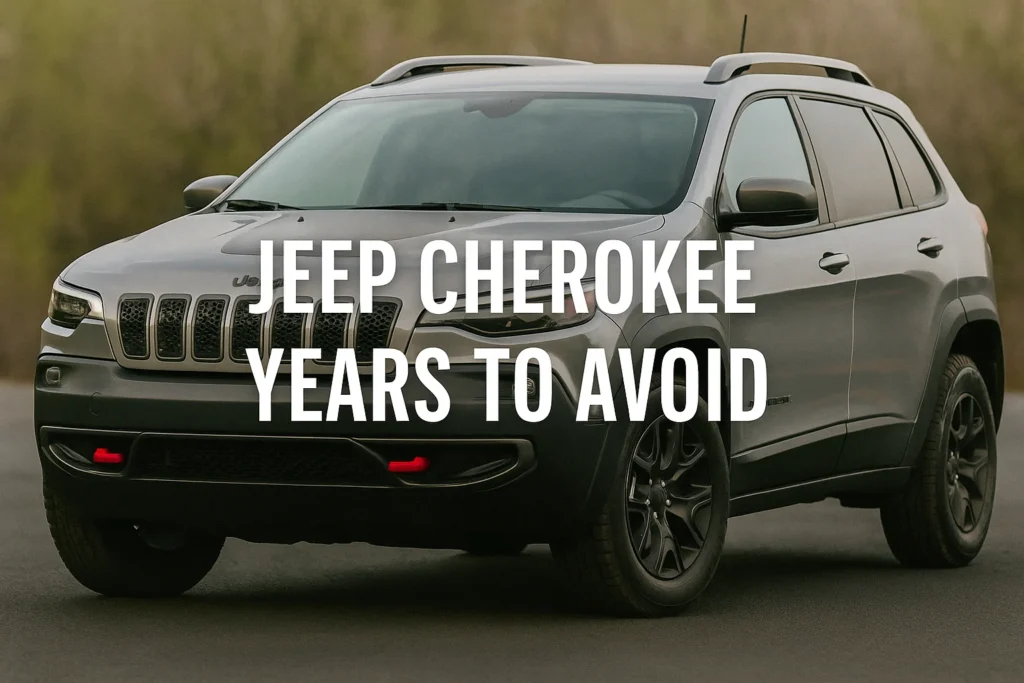Jeep Cherokee Years to Avoid (Full Breakdown by Model Year)
Jeep Cherokee Years to Avoid (Full Breakdown by Model Year) If you’re planning to buy a used Jeep Cherokee or Grand Cherokee, you’re not alone. These SUVs are known for their rugged design, off-road capabilities, and spacious interiors. However, not all model years are created equal. Some versions of the Cherokee have been plagued with serious reliability issues that make them risky choices for used buyers.
Why Avoid Certain Jeep Cherokee Years?
Over the years, Jeep has released many versions of the Cherokee and Grand Cherokee. While many have proven dependable, some model years have had repeated problems with transmission failure, electrical malfunctions, engine issues, and more.
These issues not only cost a fortune in repairs, but they also reduce the overall lifespan and safety of the vehicle.

Jeep Cherokee Years to Avoid (Full Breakdown by Model Year)
In this guide, we’ll walk you through the specific Jeep Cherokee years you should avoid—and why. We’ll break down the most common problems reported for each year, highlight any strengths they might have, and help you make a smarter, safer purchase decision.
1997 Jeep Cherokee – Outdated and Unreliable
What’s Good: Classic boxy design, strong 4.0L inline-six engine, solid off-road performance
Major Issues: Cooling system problems, electrical faults, outdated safety features
Why to Avoid: Despite its rugged build, the 1997 Cherokee lacks modern safety and comfort. Owners have reported frequent radiator leaks, head gasket failures, and alternator issues, making it a high-maintenance choice.
2000 Jeep Grand Cherokee – Transmission & Electrical Nightmares
What’s Good: Comfortable ride, V8 engine option, solid 4WD system
Major Issues: Transmission failure, power window malfunctions, engine stalling
Why to Avoid: This model year is infamous for severe transmission problems that can occur before 100,000 miles. Electrical gremlins, like windows not working and random stalling, make it unreliable.
2003 Jeep Grand Cherokee – Brake & HVAC System Failures
What’s Good: Decent interior space, refined styling for its time
Major Issues: Faulty ABS sensors, heater core issues, steering problems
Why to Avoid: The heating system frequently fails, especially in winter months. Brake problems such as ABS errors have also been reported. Combined with occasional steering malfunctions, it’s a model to skip.
2004 Jeep Grand Cherokee Laredo – Safety Concerns and Recalls
What’s Good: Affordable price on used market, comfortable seating
Major Issues: Airbag system faults, power steering loss, fuel pump failure
Why to Avoid: Numerous safety recalls have been issued for this year, especially affecting the Laredo trim. Issues with steering and airbags put drivers and passengers at risk.
2005 Jeep Cherokee – Weak Build Quality
What’s Good: Sleek look for its time, improved sound system
Major Issues: Suspension failure, dashboard warping, weak transmission
Why to Avoid: While it looks modern compared to older models, the 2005 Cherokee suffers from weak suspension components, a fragile interior, and common transmission issues that are expensive to fix.
2006 Grand Jeep Cherokee – Electrical System Chaos
What’s Good: Strong engine options, available navigation system
Major Issues: TIPM (Totally Integrated Power Module) failure, engine stall, brake lights malfunction
Why to Avoid: This model is plagued by TIPM failures, which can cause everything from non-working lights to random engine stalls. Repairing this system can cost thousands.
2009 Jeep Grand Cherokee – Engine Durability Issues
What’s Good: Good towing capacity, comfortable interior
Major Issues: Premature engine wear, ignition problems, infotainment failures
Why to Avoid: While comfortable, the engine tends to fail around 100,000 miles. Other issues include ignition failure and an outdated, glitchy infotainment system.
2011 Grand Cherokee – Suspension & Electronics Failures
What’s Good: Improved exterior design, optional air suspension
Major Issues: Air suspension failure, TIPM-related malfunctions, cruise control errors
Why to Avoid: The air suspension is great when it works, but very expensive when it breaks—which happens often. TIPM errors also affect multiple vehicle systems.
2012 Jeep Cherokee – Sluggish and Unstable Transmission
What’s Good: Spacious interior, decent fuel economy
Major Issues: Transmission jerking, hesitation, gear shift failure
Why to Avoid: This model year struggles with gear shifting. The transmission jerks or hesitates under acceleration, making it dangerous in traffic.
Bonus Mentions: Other Jeep Cherokee Years to Avoid
2013 & 2014 Jeep Cherokee: These early 9-speed automatic transmission models had serious shifting issues.
1999 Jeep Grand Cherokee: Cooling system and sensor problems that lead to frequent overheating and poor reliability.
Best Jeep Cherokee Years to Consider Instead
Some Jeep Cherokees have proven to be reliable and enjoyable. Consider these models:
2015–2018 Jeep Cherokee – These models feature updated transmissions, improved technology, and better reliability.
2019–2021 Jeep Cherokee – These newer versions offer advanced safety features, modern infotainment, and fewer complaints overall.
2004 Jeep Cherokee (non-Laredo trim) – A more reliable version with fewer recalls and more durable parts.
FAQs
What year Jeep Cherokee Years to Avoid the most?
The 2006 Grand Cherokee due to TIPM electrical system failures and expensive repairs.
Is the 2012 Jeep Cherokee a reliable option?
No. The 2012 model struggles with harsh shifting and unreliable transmission performance.
Which Jeep Cherokee years are considered reliable?
Models from 2015 to 2021 are generally the most reliable based on consumer reports and fewer recalls.
What does TIPM mean in Jeeps?
TIPM stands for Totally Integrated Power Module, a key component controlling electronics. When it fails, multiple systems can malfunction.
Should I buy a used Jeep Cherokee with over 100,000 miles?
Only if it has complete service records, a clean history, and has been inspected by a trusted mechanic.
Conclusion
Jeep Cherokees are capable and stylish SUVs, but not all model years offer a smooth ride. By knowing which years to avoid—and why—you’ll make a much better investment. Use this guide to steer clear of the most problematic models and aim for years with solid reliability and performance.


